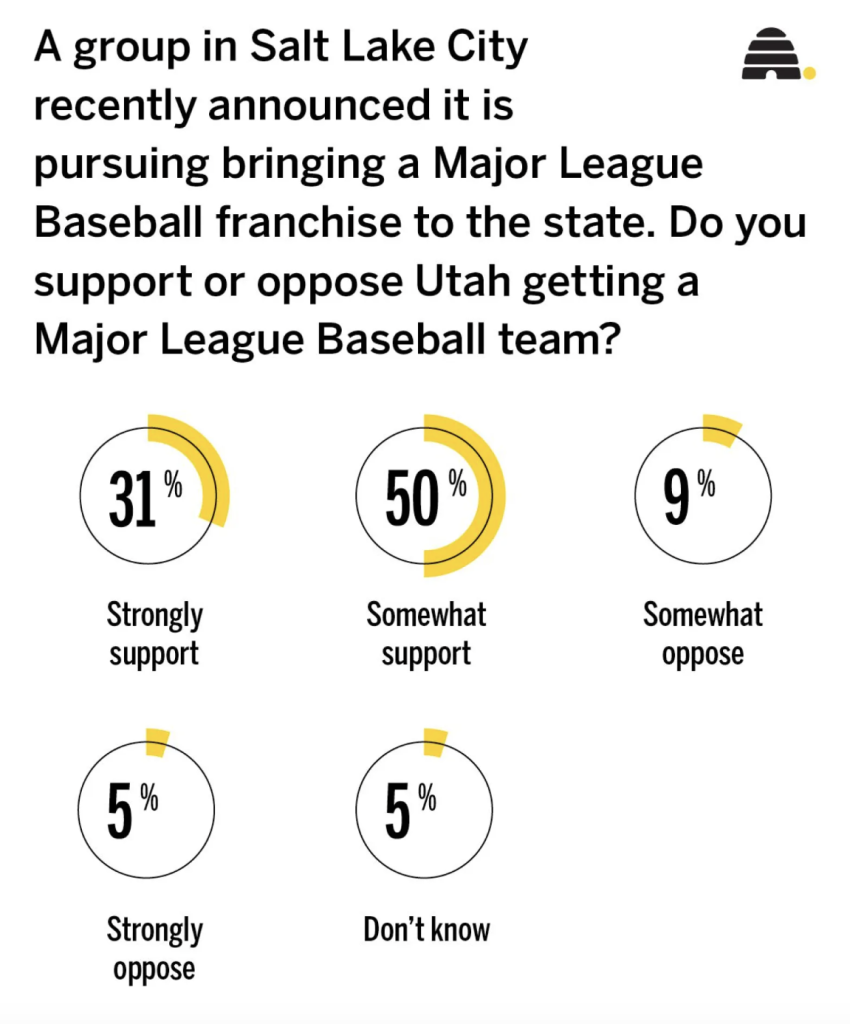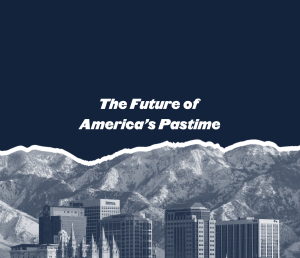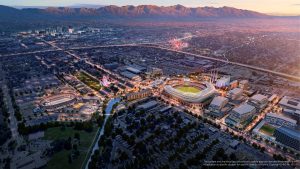
Trey and Jennee McMurtrey are expecting their first child in July. An invitation to their upcoming “All-Star Baby Shower” looks like an oversized ticket to a baseball game. And they plan to name him, naturally, after a pro ballplayer.
To say the McMurtreys, especially Trey, are big baseball fans is an understatement. He has attended games in 17 major league stadiums — COVID-19 derailed an Opening Day trip to the Texas Rangers’ new field in 2020 — and traveled to the College World Series in Nebraska four times.
McMurtrey, of Lehi, is among an overwhelming majority of Utahns who say they want to see a Major League Baseball team in Salt Lake City.
“Honestly, I think Utah would be a great community for it. I’m pumped because I’ve always wanted a baseball team,” he said. “I would get season tickets the day they were released.”
A new Deseret News/Hinckley Institute of Politics poll found 81% of residents strongly or somewhat favor bringing a franchise to the Beehive State. Only 14% are opposed and 5% don’t know.
People age 25 to 40 expressed the most support among all age groups in the survey at 87%. Those 18 to 24 expressed the least, but still three-fourths were supportive. More women than men favor getting a team.
Big League Utah
Last month, the Larry H. Miller Company announced it has assembled a coalition of influential Utahns to pursue an MLB team for Salt Lake City. Calling itself Big League Utah, the group includes business and community leaders, elected officials and former professional athletes.
MLB Commissioner Rob Manfred wants to expand baseball to 32 teams, but has said the league won’t consider adding two new franchises until the Tampa Bay Rays and the Oakland A’s resolve ongoing issues over getting new stadiums. The A’s last month announced the purchase of land for a yet-to-be-built ballpark in Las Vegas. Portland, Nashville, Charlotte and Montreal are possible expansion sites.
“Our initial research suggested that Major League Baseball would be incredibly popular in Utah, and now it’s very encouraging to see the levels of support in our state are consistent with Utahns’ support of other major sporting events like the Olympics,” Amanda Covington, chief corporate affairs officer for the Larry H. Miller Company, said in a statement regarding the poll results.
A Deseret News/Hinckley Institute poll in February found 82% favor hosting another Winter Games.
Steve Starks, Larry H. Miller Company CEO, told the Deseret News last month, “We wouldn’t be doing this if we didn’t believe we had a very good chance at being one of two expansion markets.”
Starks said it “pencils” that the company can lead an ownership group and that a team could be viable, competitive and sustain itself.
Other than the location for construction of a ballpark in Salt Lake City’s west side Power District, Big League Utah did not reveal many specifics about its plans in the first phase of its campaign. Covington said it will release more information in future phases regarding ticketing, attendance projections and stadium details.
Will fans buy tickets?
While support for landing an MLB team appears to be a home run among Utahns, many factors go into whether it would be a big hit in the stands.
The poll found slightly more than half say they would attend less than five games a season, while nearly 3 in 10 say they wouldn’t go at all. Another 13% say they would attend five to 10 games a year, while 3% would go to more than 10 games and 3% would buy season tickets.
Interestingly, people in the lowest income category were the most likely to say they would be season ticket holders. Among those making less than $25,000 a year, 8% say they would buy season tickets, compared to 7% of those making more than $150,000 year, according to the survey.
Dan Jones & Associates conducted the poll of 800 registered Utah voters April 25-28. It has a margin of error of 3.46 percentage points.
America’s pastime comes with a price not only for a potential ownership group but for fans as well.
The average cost for a ticket to an MLB game in 2022 was $35.93, according to The Hustle. The Boston Red Sox had the highest average price at $61.71, while the Arizona Diamondbacks had the lowest at $22.12.
The cost comparison found a family of four last year paid on average $204.76 to attend a game, including two beers, two sodas, four hot dogs and parking.
Is Salt Lake City out of its league?
Andrew Zimbalist, an economist at Smith College in Massachusetts who has consulted in the sports industry for players’ associations, cities, companies, teams and leagues, doesn’t see big league baseball happening in Salt Lake City, citing its relatively small 1.2 million metro area.
“I don’t think the market is large enough, at least not currently,” he told the Deseret News, adding there are not enough major headquarters in the area for corporate sponsorships.
About three-quarters of the revenue for a typical team comes from the local market, which includes luxury boxes, ticket sales and concessions, he said. National television contracts make up the rest.
“I don’t see it. I’m not even sure that Major League Baseball would approve because they have a revenue-sharing system in baseball where the high-revenue teams have to share with the low-revenue teams. High-revenue teams don’t like to have teams dragging on the bottom,” Zimbalist said.
Zimbalist also doesn’t see a deal getting done for a team without public money, “especially in Salt Lake City.” Smaller markets need 60% to 70% public financing to make it work, he said. Utah Gov. Spencer Cox has said he doesn’t support using state tax dollars to build a stadium, but acknowledged tax increment financing could be offered at the local level.
What about hockey?
The poll also gauged support for a National Hockey League team. Utah Jazz owner Ryan Smith has signaled an effort is underway to bring a franchise to the state. Fan interest in hockey appears to be substantially less than in baseball.
According to the survey, 43% of Utahns say they would never go to a game, while 41% would attend less than five games a season. Another 10% say they would see five to 10 games.
Perhaps coincidentally, 3% each say they would go to more than 10 hockey games a year or buy season tickets — same as baseball.
Zimbalist said NHL hockey would be more “thinkable” in Salt Lake City because a season has fewer games and an arena doesn’t have as many seats to fill.
“But the problem with hockey is that, both in Canada and the United States, the national television contracts aren’t very large so teams depend even more on local revenue,” he said. “It has more promise than a baseball team but I think it would still be a heavy lift.”
A Brave new world
Former Atlanta Braves star and Utah resident Dale Murphy has no doubt Utahns would embrace a big league baseball team from the first pitch. Not only will fans buy tickets but businesses will step up to the plate.
“I think the corporate support is going to be off the charts,” he told the Deseret News recently.
Murphy points to the Colorado Rockies, the team he played for during its inaugural season in 1993. The team drew more than 55,350 fans a game that year in the old Mile High Stadium.
“I think Salt Lake City is primed to react the same way,” he said. “It is just unbelievably exciting.”
Major League Baseball has faced a declining fan base for years. In 2022, attendance dropped nearly 6% from 2019 and was at its lowest in a non-pandemic season since 2007. Still, the league reported record revenue of $10.8 billion last year due to increased sponsorship deals, broadcasting rights and merchandise sales.
Average major league regular season attendance last year was 26,567 per game, according to Baseball-Reference. The Los Angeles Dodgers had the highest home attendance at 47,672 per game, while the Oakland A’s had the lowest at 9,849.
But a month into the 2023 season, the leaguewide average sits at 27,267.
Teams haven’t reacted to consistently low attendance by attempting to woo back fans at the gates. Instead, they’re lowering capacity at newly built stadiums and renovating existing ballparks. With that approach, many teams have been able to balance out and even increase gate revenue by investing in additional premium seating, according to Global Sports Matters.
Experts, per Global Sports Matters, believe that premium spaces will help boost baseball’s live-game appeal and target a demographic that the sport has long been looking to recapture: young people.
Baseball doesn’t have to recapture Trey and Jennee McMurtrey. They plan to be at Opening Day in Salt Lake City — if that happens — with little Dansby (Swanson) McMurtrey in tow
Check out the article by Dennis Romboy in the Deseret News.

